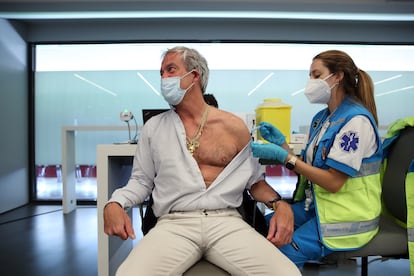Falling infection rate puts Spain in medium-risk Covid scenario
Authorities have reached a decision regarding 1.5 million under-60s who received a first dose of Oxford-AstraZeneca’s vaccine and are still waiting for a second shot

Spain’s fourth coronavirus wave has had a much smaller impact on public health than earlier surges of the pandemic, new figures show. There are improved numbers in infections, deaths and hospitalization rates, partly thanks to the rising pace of vaccination. And a long-awaited decision has been made regarding under-60s who had a first dose of the Oxford-AstraZeneca vaccine but did not know if and when they would receive a second shot.
On Wednesday, the cumulative 14-day incidence rate was 147.54 cases per 100,000 people, marking the first time since March 30 that this indicator has dropped below 150, and putting Spain in the medium-risk scenario according to the Health Ministry’s traffic-light system.
Although a few territories are still at an extreme-risk level of more than 250 cases per 100,000, such as the Basque Country (279.76) and the exclave city of Melilla in North Africa (261.84), the national average suggests that the vaccination drive and the growing number of people who have recovered from Covid-19 are containing virus transmission.
According to the latest Health Ministry report, 38.6% of the population has already received at least one vaccine dose, representing 15.5 million people. The 40-to-49 age group will start to receive doses in June according to central authorities, whose goal is to have around 70% of the adult population immunized by mid-August. Meanwhile, 3,619,848 coronavirus cases have been confirmed, although seroprevalence studies suggest this figure is probably a lot higher.
Right now there are three areas of Spain in the low-risk category, defined as fewer than 50 cases per 100,000: the exclave city of Ceuta (15.44), the Valencia region (29.58) and the Balearic Islands (45.32). A few other regions are just over that threshold: Murcia (60.81), Asturias (69.30) and Extremadura (78.29). As for Madrid, it fell just short of the extreme-risk scenario, coming in at 249.95 cases per 100,000, a slight rise from Monday (239.34).
The lower incidence is also having a positive effect on hospitals, where 18.03% of intensive care beds are now occupied by Covid-19 patients, compared with 22.4% a month ago. This number varies widely from region to region, however: it is 37.48% in Madrid and 3.77% in the Valencia region.
Another 70 fatalities were reported on Tuesday, up from Friday (58). The official death toll from the pandemic in Spain is now 79,502, although the real number is higher because thousands of people died during the first wave in 2020 without getting tested.
AstraZeneca vaccines

Approximately 1.5 million people under 60 years of age who already received a dose of AstraZeneca will get the vaccine made by Pfizer-BioNTech for their second shot, although the Health Ministry is considering whether to let recipients choose which of the two manufacturers they prefer.
The decision follows a long meeting of the Public Health Committee, which analyzed the results of a study by the Carlos III Health Institute on the effects of combining both vaccine brands on a group of volunteers. Based on these results, the Institute concluded that using the Pfizer vaccine for the second shot is safe.
According to an official statement, “everyone will receive their second dose in the coming days.” The note adds that the committee analyzed the possibility that people wishing to receive a second dose of AstraZeneca, instead of switching to Pfizer, might be allowed to do so “given the extraordinary circumstances.” The committee will continue to debate the matter further, said the Health Ministry.
The recommendation comes after the Spanish Health Ministry suspended the use of AstraZeneca on people under 60 due to associations with rare cases of blood clots. This decision, made on April 7, left 1.5 million people in limbo, mostly essential workers such as police officers, teachers, emergency personnel and some healthcare workers.
Some Spanish regions, including Madrid and Andalusia, have been defending the use of AstraZeneca for the second dose, reflecting recommendations by the European Medicines Agency (EMA) as well as 17 Spanish medical and scientific associations. Elsewhere in Europe, Germany and France have already opted for a second dose of Pfizer, while a recent study in the United Kingdom suggests that mixing vaccines increases the risk of mild to moderate side effects.
Spanish authorities opted to conduct their own study, which meant delaying the administration of the second dose beyond the 12 weeks recommended by the manufacturer for the AstraZeneca vaccine. The results show a high immune response and mild side effects similar to those produced by a double dose of AstraZeneca. But the Phase II trial cannot determine the probability of rare effects such as blood clots, as this requires an analysis of real-life vaccine administration on millions of people.
English version by Susana Urra.
Tu suscripción se está usando en otro dispositivo
¿Quieres añadir otro usuario a tu suscripción?
Si continúas leyendo en este dispositivo, no se podrá leer en el otro.
FlechaTu suscripción se está usando en otro dispositivo y solo puedes acceder a EL PAÍS desde un dispositivo a la vez.
Si quieres compartir tu cuenta, cambia tu suscripción a la modalidad Premium, así podrás añadir otro usuario. Cada uno accederá con su propia cuenta de email, lo que os permitirá personalizar vuestra experiencia en EL PAÍS.
¿Tienes una suscripción de empresa? Accede aquí para contratar más cuentas.
En el caso de no saber quién está usando tu cuenta, te recomendamos cambiar tu contraseña aquí.
Si decides continuar compartiendo tu cuenta, este mensaje se mostrará en tu dispositivo y en el de la otra persona que está usando tu cuenta de forma indefinida, afectando a tu experiencia de lectura. Puedes consultar aquí los términos y condiciones de la suscripción digital.








































